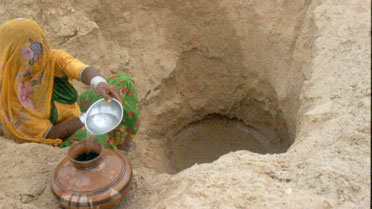Lyla Mehta, STEPS Centre water and sanitation convenor, writes about the need to look at the Millennium Development Goal on water and sanitation and what it means for gender justice, particularly as we look beyond the MDGs to potential Sustainable Development Goals.
“Current water and sanitation indicators to monitor progress are inadequate. They ignore gender dynamics, rights, equality, sustainability and equity concerns as well as regional variations,” writes Dr Mehta in a blogpost for the IDS Knowledge, Technology and Society Team blog.
In an article for CNN.com to coincide with World Water Day, Dr Mehta, along with Jennifer C Franco and Gert Jan Veldwisch, argue that the millions of hectares of land have been acquired in the past few years across Africa by investors might be framed as “water grabs” as much as they are already framed as “land grabs”.
Meanwhile IDS recently co-hosted an event with the All Party Parliamentary Group for International Development and the Environment which brought together parliamentarians with representatives from the NGO and academic communities to discuss how we can accelerate progress towards universal access to water and sanitation. The resources include an interview with Archana Patkar, Water Supply and Sanitation Collaborative Council.
Resources:
- Find out more about the STEPS Centre’s water and Sanitation work
- Are African land grabs really water grabs? By Jennifer C Franco, Lyla Mehta and Gert Jan Veldwisch, CNN.com, 22 March 2013
- Water and Justice: watch a film about the STEPS Centre’s peri-urban project, which follows three people on the fringes of Delhi and looks at their relationships to water.
- IDS Bulletin, ‘Some for All?’ Politics and Pathways in Water and Sanitation, edited by Alan Nicol, Lyla Mehta and Jeremy Allouche
- A list of the STEPS Centre’s STEPS water publications and resources which can be downloaded. Or you can search via the publications page.
- Not Another Nexus. Presentations from the STEPS event Not another nexus? Critical thinking on the ‘new security convergence’ in energy, food, climate and water
